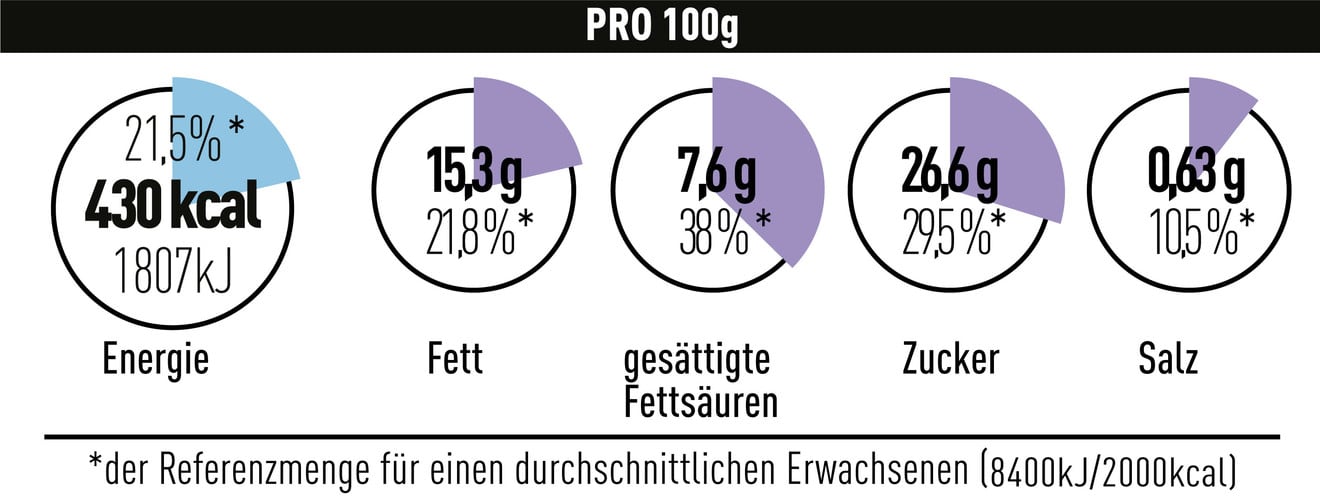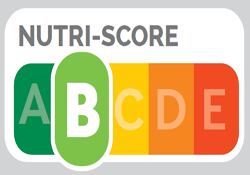German food industry association the Federation of Food Law and Science (BLL) has launched a front-of-pack nutritional value labelling model that it said provides a visual representation of the nutrients and the calories contained in packaged and processed foods.
When developing the new system, the BLL said that it needed to provide added value to the already mandatory nutrition table by delivering information on how a product relates to guideline daily intake recommendations. The reference levels refer to the amount of nutrients that an adult should eat on average daily and have been standardised throughout Europe with the Food Information Regulation.
The reference value will be given per 100 grams of millilitres but a portion reference should also be possible for single-use portion packs with a capacity of less than 100g / ml, the BLL suggested.
Significantly, the BLL concluded that the model “should not rate the food” in a way similar to traffic light or NutriScore labels. BLL President Stephan Nießner argued that these labelling systems should be ruled out in Germany because they do not have backing from the majority of the industry.
“A glance to the UK, to France, or to our country makes it clear that neither the food traffic light nor the NutriScore [systems] find support in the majority. From the outset, we have made it clear that we support the objective… of establishing a simplified nutrition labelling system in order to give consumers additional guidance. That's why we've come up with our own model,” he explained.

‘The proposal falls short’
While the German Federal Consumer Association (vzbv) said it was pleased “the food industry has recognised the problem and wants to act”, CEO Klaus Müller said that the initiative “falls short”.
“It is in our view not intuitive and immediately understandable. The juxtaposed numbers give no [indication of] how well-balanced the food is,” he argued.
Müller called on Federal Minister for Food, Agriculture and Consumer Protection, Julia Klöckner, to launch a “suitable and uniform system” throughout Germany. He warned that with individual companies voluntarily adopting alternative models for nutrition labelling, including NutriScore, leadership from the central government is needed to avoid a “patchwork of solutions”.
The vzbv believes that the NutriScore system, which was developed in France and is being introduced to a number of other European countries, offers a solution.
“We need a scientifically-based model that is tested… and developed in a dialogue process with various stakeholders. The model NutriScore from France, which is currently being discussed in Germany, is a very convincing example from the field." - vzbv CEO Klaus Müller
Klöckner, who backs the introduction of a pan-European nutritional label, said this month that Germany will introduce a national system after the European Commission postponed its report on nutritional labelling systems in Europe.

NutriScore ranks foods from -15 for the 'healthiest' products to +40 for those that are 'less healthy'. On the basis of this score, the product receives a letter with a corresponding colour code: from dark green (A) to dark red (F). NutriScore ranks foods from -15 for the 'healthiest' products to +40 for those that are 'less healthy'. On the basis of this score, the product receives a letter with a corresponding colour code: from dark green (A) to dark red (F).
However, she suggested, none of the existing systems offer an “optimal solution” for consumers and the minister has commissioned the Max Rubner Institute to develop an alternate model with should then be tested alongside existing relevant systems in consumer surveys.
"I would like to see an extended nutritional label that is understandable for the consumer and that healthy choice should be the easy choice,” Klöckner said.
NutriScore under fire
In the absence of an established national scheme, a number of companies including Danone, Bofrost, Mestemacher and McCain, have voluntarily introduced NutriScore in Germany.
However, the system has not garnered universal support. Earlier this week, the German arm of frozen food maker Iglo was issued with a preliminary injunction against the introduction of NutriScore labelling on its products by the Hamburg Regional Court.
The complaint was initiated by Munich-based trade association Schutzverband gegen Unwesen in der Wirtschaft, which states it aims to promote compliance with competition law.
Iglo immediately announced that it would file an appeal against the verdict. The company has provided NutriScore information via its website on around 140 products since January.
Antje Schubert, CEO of Iglo Germany, said the company was backing NutriScore in response to consumer demand for a “transparent, independent and easy-to-understand” labelling system. Schubert suggested that the application of NutriScore in Germany could help deliver a European response to the nutritional labelling debate. “If we in politics and business really take the European idea seriously, we must provide people with European solutions that correspond to their wishes.”
Iglo said the Higher Regional Court will now decide whether NutriScore will be banned or given the green light in Germany.


